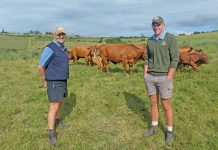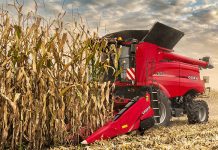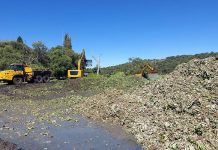Reggie Boesak is 72 years old and passionate about his community in Montagu in the Western Cape. After a heart attack forced him to retire as a pastor in 1996, he formed the Montagu Development Trust and started to look for ways to solve the social problems in the town. “Back then, the coloured community in Montagu was very disillusioned, as nothing seemed to have changed since the elections,” Reggie explains. “And due to the seasonal nature of agriculture, there was a 94% unemployment rate during the winter months.” I n 1996, 80ha of land in Zionsberg belonging to the Montagu Municipality went on sale by public auction. There was no infrastructure or tilled lands, but sufficient water from mountain run-off and six boreholes – four fresh and two brackish. “knew that this land was what the community needed to improved their self-esteem, and my grandfather’s farming blood was also flowing in my veins,” Reggie recounts
A risk pays off
I “went to the auction and put in the highest bid. When everyone had left and was alone with the auctioneer, had to confess that did not have money to pay for the farm. But told him that would get it. had to!” “An old friend from my preaching days in Holland, Freek Weelink, came to the rescue with a loan to buy the land, but it was a business loan and had to be repaid. Right up to today, he’s always been willing to support us financially,” Reggie says. “So we started farming on Zionsberg the way remembered from my childhood. We used picks, forks, spades and elbow grease to cultivate 1ha of land and produce vegetables for the shops in Montagu.
“Then one day, an official from the local department of agriculture came to the farm, telling me that people don’t farm like this nowadays. thought he was an arrogant young man, but his visit led to a grant from the department to buy proper implements, to make larger-scale production possible.” R eggie went to Pick ‘n Pay in Cape Town with Zionsberg’s butternuts, but was told they were too small to be a supplier. “was desperate to get a contract, so played the race card and said to them their attitude must be because I’m a coloured farmer. Everything happened quickly from there with a contract and favourable payment terms for us.” Pick ‘n Pay took Reggie’s butternuts, boerpampoen and squash. However the transport from Montagu to Cape Town eventually became too much.
New challenges
“In 2001, we accessed money through the agriculture department’s LandCare Programme, which had to be used for infrastructure. We repaired an existing dam, built a shed, cleaned the boreholes and got pumps for irrigation. We had decided to plant apricot trees, but which cultivars?” eggie says his neighbours initially laughed about the pastor who wanted to be a farmer. “But when they saw our vegetable production, their attitude quickly changed for the better and advice on apricot farming came streaming in. But it also became quite confusing, as each neighbour had a different idea.”
They eventually stuck to the advice from the department’s extension officers and planted 7 000 Soldoni, Super Gold and Bulida apricot trees from 2001 to 2003. E very year, they were able to access grants from the department and further loans from Holland if there was a shortfall. “Good bookkeeping helps when applying for more money,” Reggie says. They had their first crop in 2004 and harvested 170t last year. Today the Bulidas are sent for canning and the Soldonis and Super Golds are exported to Europe. “Our quality is right up there with the commercial farmers and soon we won’t refer to ourselves as ‘new farmers’ anymore,” says Reggie proudly. “Our income has also doubled over the last two seasons.”
Addressing unemployment
Fruit that can’t be exported is dried and supplied to Safari Dried Fruit and the rest is made into jam or chutney on the farm in a new kitchen that was established this year. Job creation remains one of their primary objectives and the processing side has helped in this regard. Currently the farm employs six women in the kitchen, and 22 seasonal jobs are available on the drying court and 25 picking jobs during the harvesting season. All the farm labour is recruited from the community. Reggie recently appointed Freek Fortuin as farm manager. “Freek lives on the farm, as does a foreman. As an added perk, Freek tills a section of land for his own pocket and he will share in the profits once the farm reaches that point,” Reggie says.
More new crops
In 2004 Reggie started investigating a use for the brackish water. After consultation with the department, figs were identified as a viable crop. A Turkish variety was selected and exclusive import rights were secured. That same year saw the establishment of 4ha of figs and a contract with Woolworths. “They want perfect figs, but they pay well,” Reggie says. The fruit that can’t be sold is either dried or made into jam. Reggie explains that fig production has extended Zionsberg’s season, providing additional work after the apricot season. “Our next project is pomegranates and we established 1ha last year. I believe in doing things step by step, so first we’ll see how this crop reacts before making large investments. It’s grown on a trellising system, so it’s expensive to establish.” In the interim, Reggie has become a founding member of the SA Fig and Pomegranate Association.
A resort for locals and some good advice
Only 20ha of the farm is suitable for crops, while the rest is beautiful mountain terrain. “I thought that it would be nice if our community could have a place to go for a weekend at an affordable price,” Reggie says. This led him to the idea of the Mount Zion Farm Resort. “Montagu has few recreational facilities for locals, so we plan to have chalets, a community centre, hiking trails and picnic facilities,” he explains. The planning phase and all the permits have already been finalised and Reggie hopes to build the first chalet at the end of this year.
Currently Freek owns 60% of Zionsberg shares and the Montagu Community Trust has 40%. Future profits will go into expansion and shares for the community. Reggie advises emerging farmers to ask for advice from the experts. “Successful white farmers in your area are an invaluable source of information. Attend workshops on farming practices and financial management and work hard,” he says. Contact Reggie Boesak on (023) 614 1097. |fw








